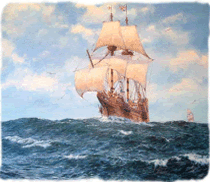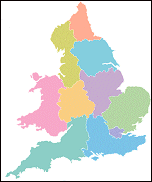Useful links: |
Woodward Family Tree by Graham Woodward |

Origin of the Woodward Name |
The name Woodward - derives from Wood-Reeve or Wood Warden. A judicial officer of a Royal Wood, appointed under Edward II's reign (1307-1327) as a “legal keeper of the vert and venison, pannage of hogs and lawning of dogs, with responsibility for referring offenders to the Verderer at the Forest Assizes”.
Introduction
Inherited surnames, as we know them today, were first used by the Chinese over 5000 years ago. In Britain their use began much later.
In Anglo-Saxon England, only single names were used, forenames or Christian names as they are often called. These were usually formed from two common words, such as Hroth-gar (from the Anglo-Saxon words for fame and spear) from which we obtain the modern name Roger. However, in Europe in the 10th and 11th centuries the Italians were beginning to use two names, the latter being called a surname. As Europe's population increased, a single name was not sufficient to identify people, and the use of surnames spread across the continent.
The Normans, or Northmen as they were originally called due to their Viking origin, conquered most of North France in 911 AD, and Rollo, the First Duke of Normandy, adopted the use of surnames to distinguish his nobles. They acquired hereditary surnames, along with their own coat-of-arms, and when one of Rollo's descendants, William the Conqueror, came to England in 1066, the practice came with him.
Sources of surnames
The use of surnames gradually filtered down to the common people, who adopted names based on a range of sources. The most common source was a person's job or occupation.
Occupational names derive from just about every known job. Of the three most common surnames in England (Smith, Jones and Taylor in that order) two are of occupational origin, with Jones being a derivative of John, the most common forename. Other common occupations that gave rise to names include Baker, Cook, Barber, Brewer and Cooper (a barrel maker).
Other sources for names came from where a person lived, such as Lester (Leicester), Hinton and Horncastle. Kirkpatrick is said to derive from living near the church (a kirk) of St Patrick, and Clifford means someone who lived near a steep bank of a river, or the 'cliff ford'. Relationships gave rise to surnames (known as patronymic) and include the son of John - Johnson, Ericson, Harrison (Henry's son - Harry is a nick name for Henry), Robinson, Wilson, Jackson, Richardson, Stevenson and Williamson etc. Names also derived from physical attributes or nicknames, such as Brown, Redman and Armstrong.
The first real Woodwards
Reaney and Wilson, in their Dictionary of English Surnames, cite the name Woodward as being of Old English origin, originally pronounced "Wuduweard" meaning a forester or wood warden. The first 'official' English reference to the name appears as Waudard in the Doomsday Book in 1086. Other evidence of the name comes from various sources in the 13th century: such as Sewhal le Wudeward in 1208; Henry le Wudeward in 1221; Ralph de Wodeward 1230; and Robert Wodeward 1296.
Europe in the Middle Ages was covered with dense woodland, and throughout English history woods and forests have been an important part of the local and national economy. They were of special interest to Royalty as a source of timber for weapons and building, of charcoal for smelting iron and also for hunting. For this reason special wardens or reeves were appointed to protect these valuable assets of the King, and whilst some suggest that Edward II (1307 - 1327) first introduced wood reeves to look after his Royal woods, their appointment is more likely to have been established in Normandy well before the invasion of England in 1066.
The King's Subsidy Roll for 1370 (in Edward III's reign) in Gloucestershire recites a large number of Wodewards in the county, and by the end of the 1400s the name was also well established in Worcestershire and Warwickshire, two heavily wooded counties and favourite haunts of Royalty. By the time that Parish Records began in 1538, the name was most common in its 'Woodward' form.
Woodwards in America
 |
Between the period 1620-1699, 850,000 people emigrated from Britain to the USA and West Indies area. There were no Woodwards listed amongst the 102 passengers on the Mayflower that sailed from Plymouth, England in September 1620, but the first record of a Woodward is of a Richard Woodward who settled in Watertown, Massachusetts, in 1634 with his wife and two sons. A survey in 1978 showed there to be just over 40,000 adult Americans named Woodward. A 1940 US survey showed that 14% were farmers, 13% labourers, 6% salesmen and 4% carpenters - the stats for the remaining 63% have not been published. |
Variations in the spelling
There are a number of variations of the name; the most common ones being Wodward, Woodard, Woodwarde, and Wodard. These variations mainly came about due to the illiteracy of the population and the wide variety of local accents. The vicar of a parish, whose job it was to record christenings, marriages and deaths, could only write down the name as it sounded to him. He couldn't ask people how to spell their name as in most cases they had no idea of how it would be written. This meant that it was not uncommon for a person to be baptised with one spelling, married with another, and buried with a headstone which showed a third variation, even though all three spellings related to the same person. As these variations were recorded they became 'official' names, and even different branches of the same family could end up with a different spelling of their name, giving the impression later that they were in fact different families. When civil registration of births, deaths and marriages was introduced in England and Wales in 1837, the variation of the name written earlier in the parish records continued as the family name. Most variations are still with us today.
Modern distribution
 |
By 1881 the county of Gloucestershire still had the highest recorded number of people named Woodward anywhere in England, but Worcestershire, Warwickshire and Nottinghamshire ran a close second. The name also appeared in large numbers in Staffordshire, Derbyshire, Oxfordshire and parts of Cheshire. By 1891 Lancashire had the highest concentration (12% of all UK Woodwards). By 1998 the number of Woodwards recorded in the UK was 20,260, ranking it as the 266th most common UK surname!. The fact that more than 2.4 million people emigrated from Britain between 1551 and 1851, helps to explain why the name also crops up as far away as Australia, Canada, North America and New Zealand. |
Summary
It seems almost certain that the name Woodward is occupational in origin, which means that in family history terms no two families with the name can be assumed to be related. This makes research of Woodward families more difficult, especially where there may be (as in the 1700s and 1800s) a large number of people with the same Christian name (John, William, Thomas etc), all born around the same time within a small radius of a town or village. However, the relatively small number of people who have the name helps balance the scales.
What is certain is that in its old english format (Waudard) it can be traced back almost 1000 years, and if, as some suggest, it has Viking origins, then it dates back even further.
Compiled by Graham Woodward, Nottingham, England (UK).